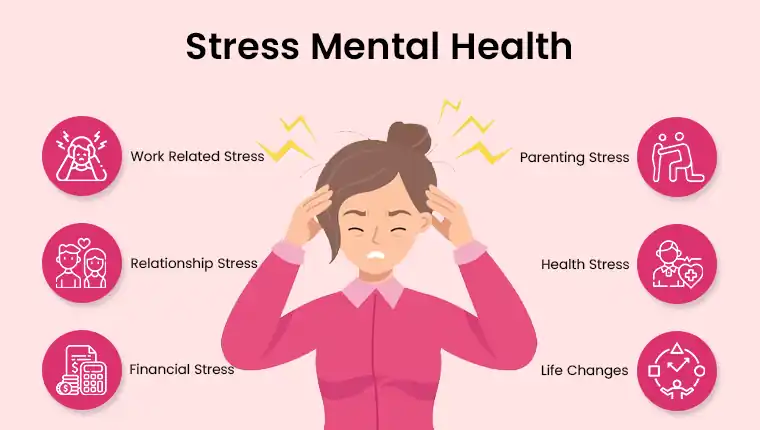Stress mental health have become prevalent topics of discussion in recent years. As our society becomes increasingly fast-paced and demanding, individuals are more susceptible to experiencing stress-related disorders and mental health issues. The evolution of stress and its impact on mental health is a complex subject that requires an in-depth examination. In this article, we will delve into the various aspects of stress and mental health, exploring their connection and the role of meditation in mitigating their effects. (Wong, P.T. and Ujimoto, K.V., 1998.)
Evolution of Stress Mental Health: From Survival Mechanism to Modern Challenge
Stress, a natural response of the human body, has been a part of our evolutionary journey for millions of years. Initially, stress served as a survival mechanism, triggering the body’s fight-or-flight response in dangerous situations. However, as society has evolved, so too has the nature of stress. In modern times, stressors are often chronic and psychological, such as work-related pressures, financial concerns, and relationship difficulties. This shift from immediate threats to prolonged stressors has significant implications for mental health.
Mental health: The Impact of Chronic Stress
Chronic stress can have a detrimental effect on mental health, leading to the development of various disorders, including anxiety and depression. The constant activation of the body’s stress response can disrupt the normal functioning of the brain, affecting mood, cognition, and behavior. Anxiety, in particular, is closely linked to stress, with individuals experiencing excessive worry, restlessness, and a constant feeling of unease. Depression, on the other hand, often arises from long-term exposure to stressors, resulting in feelings of sadness, hopelessness, and a loss of interest in activities once enjoyed. The modern world’s high-stress environment has contributed to a significant rise in mental health disorders, making it a pressing social concern.
The Role of Meditation: A Path to Mental Well-being
In recent years, medicines has gained attention as a potential tool for stress management and promoting mental well-being. This ancient practice, rooted in mindfulness and awareness, has been proven effective in reducing stress and improving overall mental health. Through various medicines techniques, individuals learn to cultivate a state of calmness and tranquility, counteracting the negative effects of chronic stress.
Mindfulness meditation, for instance, encourages individuals to focus on the present moment, allowing them to detach from stressful thoughts and emotions. By practicing mindfulness regularly, individuals develop an enhanced ability to observe their thoughts and feelings without judgment, promoting a sense of clarity and emotional resilience. As a result, stress and anxiety levels decrease, and mental health improves.
In addition to mindfulness, other forms of meditation, such as loving-kindness medicines, have shown promising results in reducing stress and fostering positive mental states. This training includes developing sensations of sympathy and benevolence towards oneself as well as other people. By directing these emotions towards oneself, individuals can counteract the negative self-talk that often accompanies stress, enhancing self-esteem and self-compassion.
Meditation's Effects on Brain Structure and Function
Scientific research has shed light on the neurological changes that occur as a result of regular meditation practice. Studies using neuroimaging techniques have revealed that meditation can positively impact brain structure and function, providing a scientific basis for its effectiveness in reducing stress and improving mental health.
For instance, brain scans have shown increased gray matter density in brain regions associated with emotion regulation, such as the prefrontal cortex, in long-term meditators. This suggests that meditation may enhance the brain’s capacity to regulate stress and emotions, leading to better mental health outcomes. Additionally, meditation has been found to reduce activity in the amygdala, a part of the brain responsible for processing fear and stress responses. These findings indicate that medicines can directly influence the brain’s response to stressors, promoting a more balanced emotional state
Integration of Meditation into Modern Healthcare
Recognizing the potential benefits of medicines, healthcare providers and organizations have started integrating this practice into mainstream medicine and therapy. Mindfulness-based stress reduction (MBSR) programs, for example, have been developed to help individuals manage stress and improve mental health. These programs combine mindfulness meditation, yoga, and cognitive-behavioral techniques to empower individuals in coping with stressors and enhancing overall well-being.
Furthermore, psychotherapists have increasingly incorporated medicines-based interventions into their treatment plans. Cognitive behavioral therapy (CBT) and mindfulness-based cognitive therapy (MBCT) are two popular therapeutic approaches that combine traditional talk therapy with meditation practices. These integrative approaches aim to address stress-related disorders by promoting self-awareness, teaching relaxation techniques, and developing cognitive strategies to manage stress and anxiety. (Cushway, D., Tyler, P.A. and Nolan, P., 1996)
Conclusion
The evolution of stress and its impact on mental health has been a challenging journey for humanity. The ever-increasing demands of modern life have significantly contributed to the rise of stress-related disorders and mental health issues. However, medicines offers a promising solution. By cultivating mindfulness, self-compassion, and emotional regulation, individuals can combat the negative effects of stress, reduce anxiety, and enhance mental well-being. As herbal medicine continues to gain recognition and acceptance, its integration into mainstream healthcare will likely provide a much-needed path to better mental health in our increasingly stressful world. (Revicki, D.A. and May, H.J., 1989. )
You Can Also Read: Looking For Medicinal Plants To Treat Ailment?






